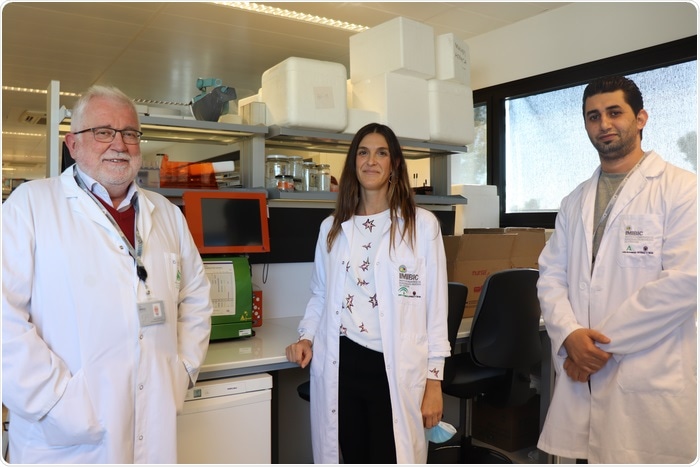Scientists from the University of Córdoba have been investigating the changes that occur in the T lymphocytes of the immune system with increasing age and with respect to the cytomegalovirus herpesvirus.

Researchers Rafael Solana, Alejandra Pera, and Fakhri Hassouneh. Image Credit: University of Córdoba.
T lymphocytes are the cells found in the immune system and responsible for protecting against viruses and cellular modifications that occur in carcinogenic processes. They can “remember” and recognize the “enemy” such that their response times are shortened when reinfections occur. The process of deterioration of the immune system with age is known as immunosenescence.
However, besides being chronological, the aging of the immune system may be based on other factors. A study by researchers from the University of Córdoba and the city’s Maimonides Institute for Biomedical Research (IMIBIC) reports cytomegalovirus herpesvirus is one such factor. This virus can accelerate the immune system’s decline, irrespective of age.
Cytomegalovirus(CMV), a more common herpes virus, is highly prevalent and increases with age. However, it does not produce any kind of symptoms. Similar to cold sores, CMV reactivates at times, and the immune system tends to rebuild a memory against it.
“This virus, unlike others, has a strong impact on the immune system. It wears it down considerably, since it generates a lot of memory, as it has to be constantly watched for,” the researchers noted.
Headed by Prof. Solana, the researchers collaborated with Emergent Researcher Dr Alejandra Pera and Fakhri Hassouneh, spending several years investigating whether the modifications and deterioration of the immune system are caused by age or by the cytomegalovirus.
Their recent studies analyzed healthy individuals in three age categories (young, middle-aged, and older), In total, 119 people were organized into two groups: infected with CMV and not infected.
Healthy donors were selected for the study through UCO students, health centers, university and hospital staff, as well as donors from a group of healthy German individuals. As part of Hassouneh’s predoctoral stay, the team joined hands with the research group under Professor Graham Pawelec from the University of Tübingen (Germany).
Dr Alejandra Pera notes that in some people, infection by this virus causes the expansion of pro-inflammatory and pro-atherogenic cells; that is, it can cause various vascular disorders, and even increase one’s chances of being affected by cardiovascular diseases by 20%.
Not all people who contract the virus generate this type of cell, but in those that do, they build up and, when they pass a threshold, a percentage, they can cause severe problems.”
Dr Alejandra Pera, University of Córdoba
At present, the researchers are investigating the behavior of these cells in patients suffering from heart diseases such as aortic stenosis, to identify the threshold enabling them to define the risk factor.
Meanwhile, they are also working on a project focused on the effect of cytomegalovirus in relation to COVID-19 and its impacts on the immune system.
The advantage of knowing that all this could have a viral origin is how we could stop it. If it were exclusively related to age, we wouldn’t be able to stop it.”
Dr Alejandra Pera, University of Córdoba
Source:
Journal reference:
Hassouneh, F., et al. (2021) Functional Changes of T-Cell Subsets with Age and CMV Infection. International Journal of Molecular Sciences. doi.org/10.3390/ijms22189973.